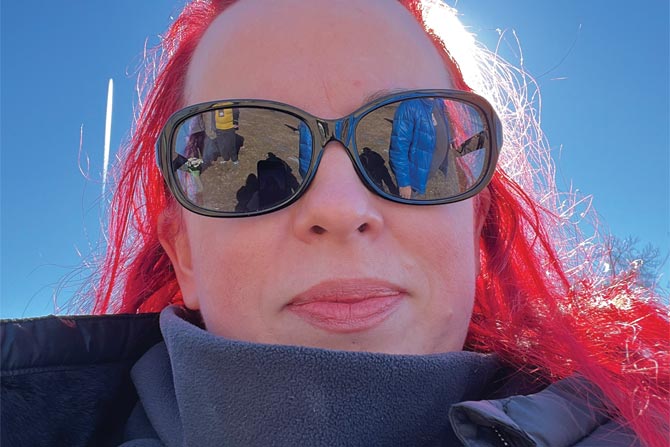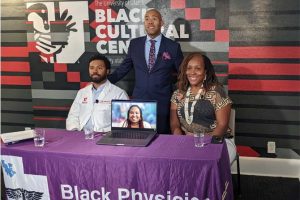First, a Bit About Dr. Sullivan:
I was born in Salt Lake City, Utah. I am a fifth-generation Utahn, but my mom and my sister and I moved away soon after I was born so my mom could pursue medical training. We lived in Cleveland, Ohio, and Gainesville, Florida, while she was preparing for medical school, and then lived in Columbus, Ohio, while she was in medical school (at Ohio State).
I was raised by a single mother who put herself through medical school, and for a long time lived with my mom, my sister, and my maternal grandmother in Cleveland — which is where I consider myself to be “from” even though I don’t think of it as my “home” anymore. My mom and her husband (they married when I went to college) live just outside New York City and are both retired. My sister and her family live in Nevada.
I never married, but I met my partner in Chicago while in medical school. He lives with me here in Salt Lake City, and we have two children, aged eight and almost six, and a very old dog, aged 15.
My interests include reading (and writing) romance novels, ballroom and hip-hop dancing, eating delicious food and playing the guitar. I also like to sew, occasionally plant things in the garden (which I’m passionate about in April and completely forget by August) and hang out with friends. I also enjoy TV and movies and like the social aspects of camping and less so the “let’s carry 50 lbs. on our backs and walk for ten miles.”
The Journey to Becoming a Physician
I first became interested in science in AP biology during my senior year of high school. My biology teacher, Joyce Calo, was a major inspiration for my interest in science, especially biology. She was an incredible educator, and I credit her for “turning me on” to Biology. Two other high school teachers played a big role in my life, Cal Rose, who taught Political Philosophy and Mark Muthersbaugh, who taught BC Calculus.
As an undergrad, I had two professors who really stood out: Dr. Mark Mahan, who taught Bacterial Pathogenesis. This course absolutely blew my mind for two reasons: bacteria have evolved INGENIOUS mechanisms to work around host defenses and Dr. Mahan was an incredibly skilled and devoted educator. He made me want to be a professor. There was another professor who taught a course on the American Civil Rights Movement, Dr. Otis Franklin Madison. He set the standard for me of what an educator should be. He was funny, but also insightful and he used narrative and storytelling in powerful ways that were truly compelling. He was the best professor I ever had.
After undergrad, I moved to Hawaii and worked at a research lab for about six months before entering into a master’s degree program in microbiology at the University of Hawaii, Manoa. I was there from 2002 to 2004. I was then accepted into the Masters of Scientists Training Program (MSTP) at the University of Chicago in Chicago, Illinois. This is a combined MD/PhD program. However, I decided to leave the PhD part of the program after three years (with a second master’s) and graduated with an MS in Pathology and an MD in 2011. I then matched into Family Medicine at the University of Utah and was in residency there from 2011 to 2014. I joined the faculty at the University of Utah Department of Family Medicine after residency and have been faculty here since 2014.
Choosing Family Medicine
The University of Chicago is a very intense medical school. It is a quaternary care hospital and as such many of the inpatient facilities are filled with people who have come from very far away (internationally) to receive care. Thus, people who I saw in the hospital during medical school were often very, very sick. I think this experience really turned me off from internal medicine (going into medical school, I thought I would go into infectious disease). It just seemed like people were so sick, all we were doing was avoiding the inevitable, but that none of these people really had much of a chance at living, rather we were just giving them a few extra months or years. And then when I went on my family medicine rotation, which was out in the community, I realized that patient care didn’t always look like that. Outpatient providers could have longitudinal relationships with patients who had a stable chronic disease but most of them weren’t “the sickest of the sick.” It seemed like this would be a much more rewarding career, because it gave you the opportunity to intervene when people were still healthy and where you had the chance to prevent some of the bad things by encouraging mammograms and weight loss and stopping smoking before the breast cancer, diabetes, and lung cancer killed them. For the most part, my experience in family medicine has borne this out — what I like most about my job is seeing patients over and over again and developing longitudinal relationships with them. These relationships mean so much to me because the thing is my patients have gotten sick and some have died but knowing them as I do makes the interactions I have with them more meaningful for me (and I hope for them) and it feels like I can be an ally for them in their journey and not just a bystander.
The Rewards of Teaching Residents
An aspect of my job I find the most meaningful is interacting with the residents. I feel like I have a very symbiotic relationship with them — they teach me, and I teach them, and we all joke about being indoors when the weather is glorious on Friday afternoons. First and foremost, I aspire to be an educator. And what my undergraduate professor Dr. Madison taught me is that a good educator is really just a good storyteller. If you can get people interested in the tale you are weaving, you can sneak in all kinds of healthful and useful information (kind of liking sneaking kale into meatloaf). Dr. Madison wasn’t the first educator I had who was a storyteller, but he was probably the best and I don’t think (educationally) I’ve ever been more enthralled than I was sitting in his classroom — and that really made me want to have the same effect on people, to captivate and enthrall them. I don’t think I am nearly as successful as he was, but it’s good to have aspirations.
Why did you choose to practice in your area of focus? What are some of the rewarding aspects of this type of care?
I guess my focus would be considered LGBTQ medicine, specifically HIV Prevention and gender-affirming hormone therapy for folks who identify as transgender. Sometimes I don’t feel like I “chose” this specialty, but more that it just fell into my lap. There was a need for these services in my community and I filled it.
The most rewarding part of what I do is developing long-term relationships with patients — those are the interactions that mean the most to me. To some extent, I function as a “specialist” in that I do gender-affirming hormone therapy management for folks seeking these services, but I am not their primary care physician. Although this is also very rewarding and serves a role that my community needs, I feel like I get the most reward from seeing my transgender and LGBTQ patients for whom I am their primary care provider. These are individuals who I’ve been taking care of for years, and there is a real comfort from knowing them longitudinally and feeling like I am doing something that helps them beyond just offering PrEP or hormone therapy.
To some extent, I feel drawn to provide care for the LGBTQ community because they have historically been disenfranchised from receiving compassionate, evidence-based care, and it feels good to be able to provide care to someone who maybe has not had good experiences with the “medical-industrial complex” and to help change their mind about what having a primary care provider can be. For example, I think some men who have sex with men have felt that all of the other care providers they’ve seen don’t really take the time to understand the gay culture or gay sex. I’m really proud I can be a resource for these folks and create a space where they can feel comfortable talking about things with me that maybe they’ve never discussed with another provider. It seems to me that all people should be able to feel comfortable with their PCP – like there will be no judgment about how someone is living their lives. If they have a question about this or that, their provider will be knowledgeable about it and able to provide information that is evidence-based and culturally informed. I’m glad that my knowledge is broad, and that I feel equally comfortable talking about SSRIs and anal sex and reliable forms of contraception. It makes me feel like a reliable medical information resource to my community.
But I also wish that someone like me didn’t need to exist. By that, I mean I wish that there didn’t need to be a primary care provider who knows a lot about LGBTQ medicine because really, what that is saying to other primary care providers is that this is “specialty medicine,” and it takes the onus off of them to know how to care for this population. I don’t believe that should be allowed or tolerated. As primary care providers, we don’t have a choice about who we get to see — that is not the spirit of primary care. We know a little bit about everything. I don’t think it’s okay for a gay man to go to a doctor in Provo or Vernal asking to be put on PrEP, and the provider says, “That’s not something I do; you’re going to need to see someone else.” Because it should be something they do. It must be. Gender affirming hormone therapy and HIV Prevention aren’t specialty medicines, they are primary care. Medical schools across the country need to do a better job of incorporating LGBTQ medicine into their curricula.
There is so much legislation targeting the LGBTQ community seemingly sweeping the nation. It is obviously hateful and intended to further disenfranchise and cause deliberate harm to an already marginalized community. It is medically uninformed, and when viewed through the “arc of the moral universe,” it will in time be recognized for what it truly is: hate speech manifested as legislation passed by bigoted and ignorant zealots. I am embarrassed by any legislature that enacts laws deliberately seeking to further marginalize the LGBTQ community and remain cautiously optimistic that these laws will be repealed or overruled as unconstitutional, which they most certainly are.
Practice Changes Due to COVID-19
I have an entire day that is now virtual visits solely due to the pandemic. I think this is great and that a lot of medical problems really lend themselves to the virtual format. I hope virtual visits don’t go away and reimbursement rates don’t decrease for virtual visits because I think we would stop offering them. I am convinced that virtual visits have expanded the capacity for individuals to receive care they otherwise would not have received. This is particularly true for marginalized communities like LGBTQ folks, especially those living in rural communities. But I worry that reimbursement rates for these visits will drop, and we would be economically forced to stop offering them. That would be calamitous to these vulnerable populations, particularly in the conservative intermountain west.
Right now, we are experiencing massive staffing shortages, and I think this means that we need to pay our support staff more money to encourage folks to enter healthcare. Similarly, we need to improve reimbursement rates for primary care to keep primary care providers in the workforce. If we don’t do something about pay inequity in the primary care space, we will not have the clinical bandwidth to care for our population. Every family physician in our practice works part-time (clinical) because the reality of seeing 25 patients a day, four and a half days a week, just isn’t sustainable long-term. Simply put, family physicians need to be paid more. By improving reimbursement rates for primary care, family physicians would not be forced to see 25 patients a day — the pace just isn’t sustainable.







